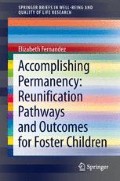Abstract
Few foster care studies have utilised standardised instruments as measures to gain an in-depth understanding of the factors that predispose families to interventions involving out of home care at entry to care, as well as readiness for restoration at case closure. This study addresses this knowledge gap by using a practice-based assessment tool (NCFAS-R) as a comprehensive measure of family functioning and outcomes. Change scores provided a standardised measure to assess the amount of family change achieved during the temporary family care service period. Overall, the changes in the measurement domain ratings between intake and closure show a broad shift away from problems towards strengths.
Access this chapter
Tax calculation will be finalised at checkout
Purchases are for personal use only
References
Barth, R.P., Guo, S. Green, R.L., McCrae, J.S. (2007). Developmental outcomes for children in kinship and nonkinship care: Findings from the national survey of child and adolescent well-being. In R. Haskins, F. Wulczyn & M. B. Webb (Eds.), Child protection: Using research to improve policy and practice (pp.187–206) Washington: Brookings.
Biehal, N. (2006). Reuniting children with their families: Reconsidering the evidence on timing, contact and outcomes. British Journal of Social Work, 40(6), 1719–1735.
Cuddeback, G. S. (2004). Kinship family foster care: A methodological and substantive synthesis of research. Children and Youth Services Review, 26(7), 623–639.
Kirk, R., & Reed, K. B. (2000). Designing and developing a new assessment and evaluation tool for family preservation service programs. In F. Jacobs, P. Hrusu Williams, J. Kapuscik, & E. Kates (Eds.), Evaluating family preservation services: A guide for state administrators Family Preservation Services Project. Medford: Tufts University.
Paxman, M. (2006). Outcomes for children in Kinship care. An Issues Paper New South Wales: Department of Community Services.
Reed-Ashcraft, K., Raymond, K., & Fraser, M. (2001). The reliability and validity of the North Carolina family assessment Scale. Research on Social Work Practice, 11, 503–520.
Author information
Authors and Affiliations
Corresponding author
Rights and permissions
Copyright information
© 2013 Springer Science+Business Media Dordrecht
About this chapter
Cite this chapter
Fernandez, E. (2013). Assessment and Intervention. In: Accomplishing Permanency: Reunification Pathways and Outcomes for Foster Children. SpringerBriefs in Well-Being and Quality of Life Research. Springer, Dordrecht. https://doi.org/10.1007/978-94-007-5092-0_4
Download citation
DOI: https://doi.org/10.1007/978-94-007-5092-0_4
Published:
Publisher Name: Springer, Dordrecht
Print ISBN: 978-94-007-5091-3
Online ISBN: 978-94-007-5092-0
eBook Packages: Humanities, Social Sciences and LawSocial Sciences (R0)

